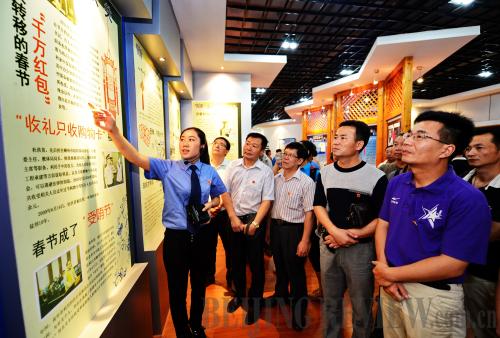|
 |
|
RAISING AWARENESS: Local officials visit an anti-corruption exhibition in Nanping City, Fujian Province, on July 5 (ZHANG GUOJUN) |
Disclosure of officials' private assets can enhance transparency and help fight corruption, but has been stalled for a long time in China. Now, change may be coming in the form of an unprecedented breakthrough.
Newly promoted officials will be required to publicize information including their families' assets, their spouses' and children's jobs, their incomes, as well as entry and exit records, according Li Xueqin, an anti-graft official of the Communist Party of China (CPC).
Li, head of the Research Division of the CPC Central Commission for Discipline Inspection (CCDI), made the remarks on December 1 during an online interview about decisions made during the Third Plenary Session of the 18th CPC Central Committee. The Party's top decision-making body met in Beijing on November 9-12, pledging to establish scientific and effective mechanisms for restricting officials' power and to enhance and innovate systems for identifying corruption.
Under the current regulations, Party and government officials are required to report their private asset information to supervisory authorities, but this information remains unavailable to the public.
"The current system, which was established in 1995, is not comprehensive because there are no verification measures to check the authenticity of declarations, nor is there harsh punishment for those who lie during the declaration process," said Ren Jianming, Director of Beihang University's Clean Governance Research and Education Center.
New methods
Li said that anti-graft authorities will speed up the verification process for reported assets by officials, and punishments will be more severe for those who lied on their declaration.
In 2009, a pilot project was carried out in the city of Altay in northwest China's Xinjiang Uygur Autonomous Region that requires local officials to disclose their private assets. In the end, it was canceled due to resistance from government officials. Approximately 70 percent of local officials were reported to have opposed the project, while only 10 percent were willing to publicize their families' assets.
It's easier to persuade lower-ranking, newly promoted officials to disclose their families' assets, said Li Yongzhong, an anti-graft expert with the China Discipline Inspection and Supervision Institute.
Xu Yaotong, a professor at the Chinese Academy of Governance in Beijing, suggested that there should be a channel for the public to acquire information on officials' private assets.
In August, an article published in Study Times, a weekly newspaper affiliated with the Party School of the CPC Central Committee, suggested that a national real estate ownership registration database could help supervise officials and restrain corruption.
Through a national database, anti-graft agencies and the public could more easily track down properties owned by officials, and corrupt officials would face greater risks when registering properties under someone else's name.
Jiang Ming'an, a law professor at Peking University, said that anti-corruption authorities must remain determined when promoting these measures. "News reports about officials owning a large number of houses have triggered public anger many times," he said.
Liu Zhijun, former Minister of Railways, received a suspended death sentence for taking bribes and abuses of power in July and was allegedly the owner of 374 houses, though this number remained unconfirmed after court proceedings.
Huang Sheng, former Vice Governor of east China's Shandong Province who received a life sentence in May on corruption charges, owned 46 apartments, according to Xinhua News Agency.
Li Xueqin with the CCDI said that his commission will continue to dispatch inspection teams to government bodies, state-owned enterprises and government-affiliated institutions to further improve supervision of officials.
The authorities will create regulations to tighten supervision on "naked officials"—officials whose spouses and children live overseas, he said.
| 